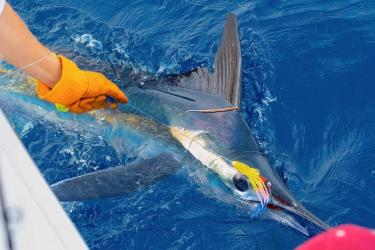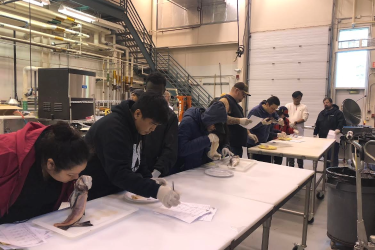Where did you grow up?
I grew up in a small town in Vermont. I spent most of my childhood outside in nature, driving my interest in environmental science. Being from a landlocked state, I was always eager to visit and explore the ocean. This ultimately motivated me to study both marine and environmental sciences in college.
Where did you go to school and in what subject did you get your degree(s)?
I completed both my Bachelor of Science and Ph.D. at Northeastern University in Boston, Massachusetts. My undergraduate degree is in environmental science with a concentration in conservation sciences and minor in marine biology. My Ph.D. is in marine and environmental sciences with a concentration in sustainability sciences. While my office was at Northeastern’s Marine Science Center in Nahant, Massachusetts, my dissertation work brought me to the Florida Keys for a case study in social-ecological system dynamics. While there, I conducted participatory modeling interviews and creel intercept surveys—a method of collecting information from anglers about their fishing activities—to better understand differences in fishing access for shore-based fishers.
How did you come to work at the Southeast Fisheries Science Center?
At the start of my Ph.D., I was fortunate to receive funding from the National Science Foundation Graduate Research Fellowship Program. Through this fellowship, I had the opportunity to participate in the NSF Graduate Research Internship Program. My ongoing thesis work in the Florida Keys cultivated research questions about differences in fishing access and participation in the fisheries management process more broadly across Florida in the recreational fishing sector. With the help of Drs. Skyler Sagarese and Shannon Cass-Calay in the Sustainable Fisheries Division at the Southeast Fisheries Science Center, and my Ph.D. advisor Dr. Steven Scyphers, I developed a project to understand data needs and potential management approaches to identify barriers to participation in decision-making processes. To do this, I interned at the center in Miami during the winter of 2020 to conduct participatory modeling interviews with stock assessment scientists, managers, and researchers in the area. During this internship I saw the amazing work being done at the center and became eager to continue my work there. I went on to do two postdocs, one of which was at the Alaska Fisheries Science Center in Juneau, Alaska. As my second postdoc at the Smithsonian Environmental Research Center was wrapping up in Edgewater, Maryland, my current position opened and I jumped at the opportunity!
What do you do at the science center?
I’m a Research Social Scientist in the Social Science Research Group. In this role, I use quantitative and qualitative social science methods to incorporate human dimensions into fisheries management. I use tools such as participatory modeling, scenario planning, and social indicators to understand the social impacts of management decisions and environmental stressors on fishing communities. Currently, I’m working with colleagues across the science center to provide decision-support for changing oceans and ecosystem-based management approaches.
What do you like most about your position?
I love talking to fishermen and coastal community members to understand different perspectives and experiences. It’s crucial that fishermen are brought to the table during decision-making so that scientists and managers understand social impacts on livelihoods and well-being. As a social scientist, I have the opportunity to conduct research and public engagement to help inform those decisions.
What advice would you have for someone interested in a career at NOAA Fisheries?
My experience as a NOAA Fisheries intern opened the door for collaborations with NOAA scientists who were instrumental in helping me get to where I am today. Find opportunities for internships or collaborations and network as much as possible!
Is there a book, quote, or person that influenced you to be the person that you are today? Tell us why.
My family. My parents both have an incredible work ethic and always instilled that in me. I’m a first-generation college student, so my parents encouraged my siblings and me to work hard and attend college to take advantage of the opportunities they didn’t have. My older sister and brother were also great role models going to college before me. My sister has her masters in biochemistry, so she exposed me to science, research, and education opportunities at an early age.
What do you like to do outside of work?
I love to travel. I drove to and from Alaska during my two moves and have now been to 41 states. I’m eager to check off the remaining few! I particularly love to hike and explore national parks with my dog, Scout.





